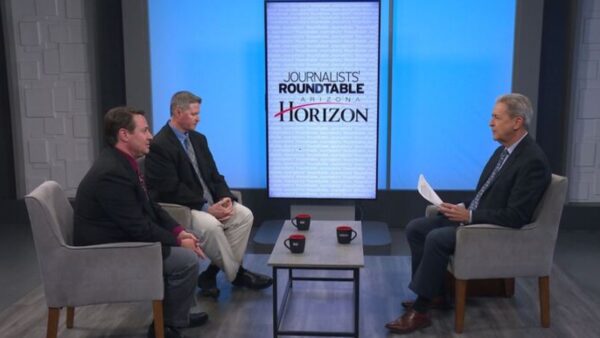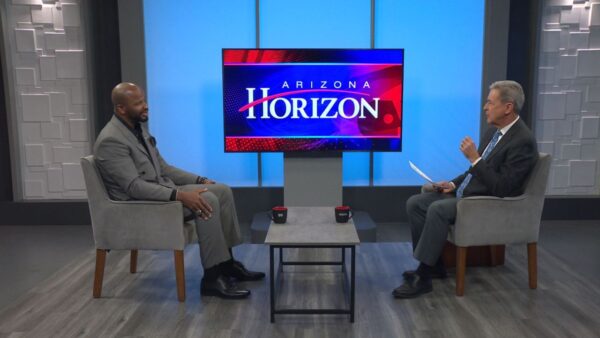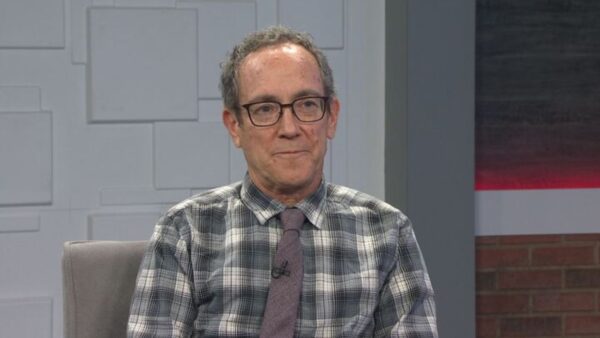Western history author Bob Boze Bell is releasing his next book later this month, a biography of the iconic American frontier known as “Wild Bill.”
The Illustrated Life and Times of Wild Bill Hickok is Rosa’s 13th book, many of which have centered around the life of Hickok. Bell says his latest book is full of stunning artwork, rare photographs and an immersive history of the 19th-century gunslinger.
Ted Simons: James Butler Hickok, better known as wild bill Hickok, was a scout, a soldier, a gunfighter and a lawman. But he is perhaps best known for just being wild bill hickcock. A legend of the American west. Local artist and historian Bob Boze Bell is out with a new book on this colorful old west figure. It is titled, The illustrated life and times of wild bill Hickok. The first gunfighter. And here to talk about his new book, our good friend, Bob Boze Bell. Good to see you again.
Bob Boze Bell: Good to be here.
Ted Simons: I noticed that this book is curiously titled book one. What does that mean?
Bob Boze Bell: My wife helped me in the sense that she -- I was struggling with my first book. This is my 13th book. Okay. I can't finish this. I have a deadline, I have an art show, Brown art gallery. I’m not going to finish. She said I'll help you finish it. And I said what’s that. She said go to the first page and type these two words. What? Book one. And so I've always put that on the first part of my books, because it's true. Because every writer -- every researcher -- is trying to find the next thing. They need one more thing. And I know many fine researchers who have never finished a book. So that's why it says book one.
Ted Simons: It's on the binding and everything.
Bob Boze Bell: It's serious.
Ted Simons: All right. Let's seriously, so to speak, talk about wild bill. Who was wild bill Hickok?
Bob Boze Bell: He's a caricature almost now. He’s almost like a glorified road runner cartoon. But this dude, this guy, invented the entire wild west genre of the gunfighter. When you see a movie, when you see "Gunsmoke," when you see" "Deadwood,” when you see the guy in the middle of the street and daring the other person to draw, if you distill that down to one guy and event, it's wild bill Hickok. It's amazing because his name wasn't Bill.
Ted Simons: Okay. As you're writing the book, a lot of people were called wild bill, wild this and that. And wild bill was almost like a "Hey you" or something.
Bob Boze Bell: It's a "Hey you" moniker. And we don't know the specifics of when he was named that. There was some speculation that there was an event. He stood up and said, "Don't do that." And the woman at the back of the crowd says, "He's a real wild bill. ". That's all we got.
Ted Simons: That’s it.
Bob Boze Bell: That’s it but what a name.
Ted Simons: And what a history. And what drawings and photographs. Let’s get to some of these things now. You did a great job of putting your artwork interspersed with photographs and historical elements. And we’ll start with shots of -- there's the man. Describe this guy. He was tall and rangy, wasn’t he?
Bob Boze Bell: Tall and rangy. Handsome. A big nose. A lot of people called him duck Bill because of his nose.
Ted Simons: Interesting.
Bob Boze Bell: But look at that. He's got weapons. So many of the other characters in the old west, we get the banker look. Not wild bill. That guy is styling. This is really early. Probably late 1850s.
Ted Simons: That one right there? How old is he right there?
Bob Boze Bell: In his 20s.
Ted Simons: Let's keep it moving. We have a lot of shots of wild Bill. I got to tell you, throughout your book he is dressed in some of the most outrageous garments of the time. What is with the pants there?
Bob Boze Bell: You know, the checked pants are fantastic. That cape is just wonderful. And if you're a fan of the TV show "Deadwood ," wild Bill in that show, there are scenes where he has that exact same cape on.
Ted Simons: So -- but that's. I got to tell you, Bob, that does not look like the wild west to me. That looks like a floor show or something.
Bob Boze Bell: Well, it's got a little bit of Jack the Ripper going on there. But this is what's so amazing about the guy. All the other guys, from Wyatt Earp to Billy the kid. Billy the kid, we have one photo of him in a bad hat.
Ted Simons: And you got tons of this guy.
Bob Boze Bell: With wild Bill, look at this. This man is styling it.
Ted Simons: Alright let’s go to Deadwood now. Where is Deadwood and why is this important to the story of wild bill Hickok?
Bob Boze Bell: In the Laramie treaty of 1868, the U.S. government, Sherman, he negotiated a treaty with the Indian tribes in the Dakota territories. And he said this land will be yours forever until the cows come home, yada, yada, yada. And, of course, six years later, Custer leads a huge expedition into the black hills and discover gold and can't keep people out of there. When the town of Deadwood springs up, it's an illegal town. Shouldn't be there. The U.S. Army kept kicking them out. And finally went to the President and said, you know, offer them some cash. Let's get them out of there. It's the age-old American story.
Ted Simons: That's where he wound up.
Bob Boze Bell: He ended up there in the town of Deadwood, an outlaw town.
Ted Simons: After, he was in Kansas, he was a scout for the union. Correct?
Bob Boze Bell: Yes.
Ted Simons: And obviously the gunfight. And he was a law man.
Bob Boze Bell: He was a law man. A reputable law man. He did get defeated, though. We have this idea when we see movies and stuff, you know, that Wyatt Earp is the sheriff forever. He's old. No, no, these guys had very short tenure. He got kicked out of office very quickly.
Ted Simons: Short tenure, but lots of hair. He had long hair. What's the deal, again, with these guys from this period with long locks?
Bob Boze Bell: Well, it was a holdover from the mountain men. And the mountain men wore their hair long because, in the Indian culture -- native American culture -- okay, you had to have long hair. What you were doing was you were taunting your enemies. Come and take it, dude. You want this hair?
Ted Simons: You want my scalp?
Bob Boze Bell: You want my scalp? They wanted to be worthwhile. In fact one of the Indians complained to one of the generals. You have to let their men grow hair longer. It's not an honor to cut their hair.
Ted Simons: So this is basically Wild Bill. This is a shot of wild Bill saying --
Bob Boze Bell: Come and take it.
Ted Simons: Yes. In your face. I'm wild Bill. You said he was a good-looking guy, at least the women folk thought he was good looking. It sounds like he might have gotten caught with the ladies a little bit there.
Bob Boze Bell: Basically when you study the stories, he was a rock store. Buffalo Bill and wild bill Hickok were rock stars of their era. They had the attendant groupies, they were not called that then, but they had a lot of attention from females. And they were traveling around the countries in big shows which were ostensibly rock shows and the women lined up at the stage door, and you know the rest.
Ted Simons: Yes. And the rest could lead to problems and complications health-wise.
Bob Boze Bell: That is correct. And there is some supposition that he in fact got something he didn't want.
Ted Simons: Yes. We'll leave it at that. As far as wild Bill -- we have a shot of wild Bill styling. Again, another shot. You're right. Look at all the photos of this guy. Goodness gracious, he was making selfies before there were cameras.
Bob Boze Bell: Well here’s a look of a telling incident. A gentleman in the 1920s said, yes, I was in Abilene in the bank, and wild Bill came in, and I was just standing there at the teller, and he was handing out photographs that he had just taken. How telling is that? How many do you want to order, Mr. Hickok? Give me 50. Okay. He's going out and going to the bank and handing these out. You know?
Ted Simons: Pretty sure of himself. But there's the long locks on the right. And on the left, that checkered outfit again.
Bob Boze Bell: Yeah.
Ted Simons: Oh, boy.
Bob Boze Bell: You know, the other thing is that we have this idea from the movies that everybody wore brown
Ted Simons: Yes.
Bob Boze Bell: And some pretty boring stuff. But as is evident from these photographs, they were styling. They had checks. They had really loud things. We don't see it because the photographs are black and white.
Ted Simons: That’s an interesting point. Wild Bill, spit take -- what are we looking at here?
Bob Boze Bell: Wild Bill, after 1871, he had his last gunfight, he shot one of his best friends by accident.
Ted Simons: Yes.
Bob Boze Bell: He was in the gunfight and he heard steps coming and he was standing off like 50 Texas cowboys on the street. He heard footsteps and turned and fired. It was one of his best friends. Never fired in anger again, never served as a law man. What am I going to do with myself now? He got an offer from buffalo Bill to go on the stage. So he went back to New York and he got involved with a show called "The Combination." And a they toured. And he hated show business. This is one of the reasons I love this guy. He hated the media and he would hate you and I so bad. He hated the fakery. So there was an instance where he -- they had a take and they would pass around a liquor bottle on the edge of the stage and they would take a swig and tell a tall tale. And so it got to Hicock, and he took a swig, allegedly -- and he spit it out -- and he said, tea don't count. If I don't get whiskey, I won't tell it. The audience loved it. They kept it.
Ted Simons: They kept the line in the whole show?
Bob Boze Bell: Yes, they kept it.
Ted Simons: Calamity Jane is in here. It seems like she is everywhere when it comes to-- Who is Calamity Jane? We're running out of time, and this is about wild Bill, but who is Calamity Jane?
Bob Boze Bell: Calamity Jane ends up to be the paramour to wild Bill. And they end up in movie after movie as being lovers. Here's what really happened. She was dressing like a man, a teamster, may have been a -- we don't have proof that have. When Wild Bill died, she was in town at the time. She lived another 25 years and told all the press about how she cradled his head and loved him. Wild Bill was actually married to someone else. But she was 50 years old and a grandmother. That's not sexy. When movies came calling, you know what? Go with Calamity Jane. When she died she requested to be buried next to him, and the town, of Deadwood, as a joke, buried them together because they knew he would be spinning in his grave. You can't make this up.
Ted Simons: Can't make up much of this. The last shot is of basically comics and his place in the American culture. That's my last question to you. What is it about these people? These are people that didn't live the most responsible lives, don't want your kid to grow up to be wild Bill. But look at the attention they get. Why?
Bob Boze Bell: Well, Americans, and people around the world, like someone who is outrageous. If they can pull it off. You know? Babe Ruth pointing to the stand before -- wow. And you pull that off? You're going to get attention. Wild Bill was that guy. Even as a kid, he told his sisters, I'm going to do things that Kit Carson, his hero, never dreamed of doing.
Ted Simons: And he did.
Bob Boze Bell: And he did. And every time you see a western and see guys facing off in the street, that's wild bill Hickok.
Ted Simons: And the quote in the end, in the end, myth conquers all. Some of it's true, maybe some not so much true.
Bob Boze Bell: No, we to want believe the myths.
Ted Simons: Congratulations. Great-looking book. Great stuff. Thanks for being here. Good to see you again.
Bob Boze Bell: Thanks.
Ted Simons: And Wednesday on Arizona horizon, we’ll hear what education advocates would like to see state lawmakers to do for schools in the upcoming legislative session. That's Wednesday right here on Arizona horizon. That's it for now. I'm Ted Simons. Thank you for joining us. You have a great evening.
Video: Arizona horizon is made possible by contributions from the friends of Arizona PBS, members of your PBS station. Thank you.
Bob Boze Bell: Author, "Wild Bill Hickok: The First Gunfighter"




















